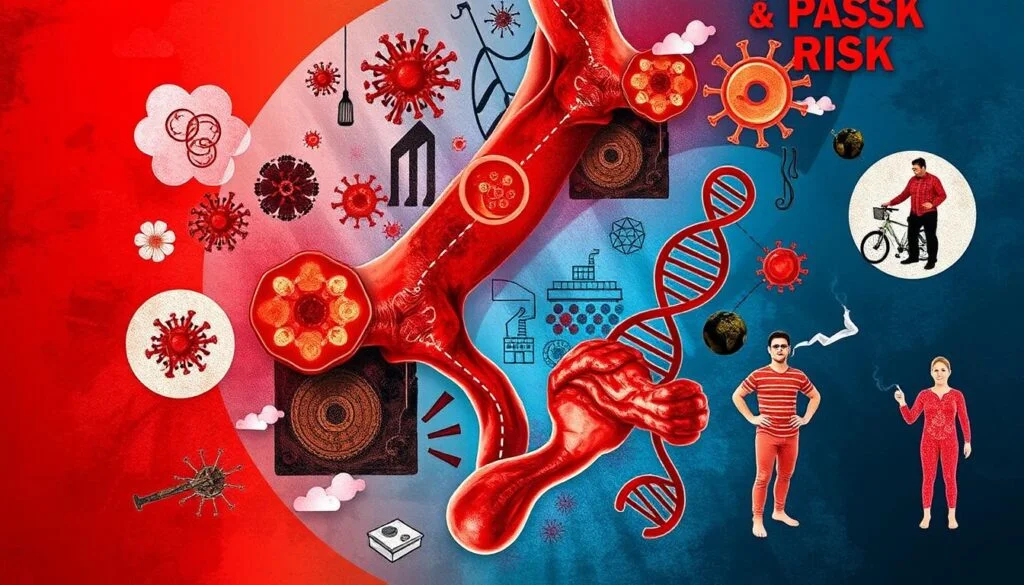Causes of psoriatic arthritis: Triggers and risk factors
Causes of Psoriatic Arthritis: Triggers and Risk Factors
Psoriatic arthritis is a complex autoimmune disorder that affects millions worldwide. It’s important to understand its causes and risk factors for effective management. This section explores the elements that contribute to psoriatic arthritis, helping healthcare professionals and individuals understand this disease better.

Key Takeaways
- Psoriatic arthritis is an autoimmune disease with a strong genetic component.
- Environmental triggers, such as physical trauma and infections, can play a role in disease onset.
- Obesity and metabolic syndrome are significant risk factors for psoriatic arthritis.
- Lifestyle factors, including smoking and alcohol consumption, can exacerbate the condition.
- Stress and mental health are closely linked to disease flare-ups and progression.
Understanding Psoriatic Arthritis: An Overview
Psoriatic arthritis is a chronic condition that affects the skin and joints. It’s an autoimmune disorder that often comes with psoriasis. About 30% of people with psoriasis also get joint pain and inflammation.
What is Psoriatic Arthritis?
Psoriatic arthritis is a form of inflammatory arthritis linked to psoriasis. It causes joint pain, stiffness, and swelling, mainly in fingers, toes, and the spine. If not treated, it can damage joints and lead to disability.
Common Symptoms and Signs
- Joint pain, stiffness, and swelling
- Nail changes, such as pitting or separation from the nail bed
- Reduced range of motion and flexibility
- Fatigue and overall malaise
- Skin rashes or plaques associated with psoriasis
Impact on Daily Life
Psoriatic arthritis can greatly affect daily life. It makes simple tasks hard due to joint pain and stiffness. It also affects self-esteem and social interactions because of visible symptoms.
| Aspect of Life | Impact of Psoriatic Arthritis |
|---|---|
| Mobility | Difficulty walking, climbing stairs, and performing physical tasks |
| Self-care | Challenges with dressing, bathing, and other personal care activities |
| Social Interaction | Reduced participation in social activities due to physical limitations and self-consciousness about appearance |
| Mental Health | Increased risk of depression, anxiety, and reduced quality of life |
Understanding psoriatic arthritis is key to managing it. Knowing its causes, symptoms, and daily impact helps improve life for those with this chronic condition.
The Autoimmune Connection in Psoriatic Arthritis
Psoriatic arthritis is closely linked to an autoimmune disorder. This means the body’s immune system attacks its own healthy tissues. This attack plays a big role in the disease’s development and growth.
The link between psoriasis and joint inflammation is complex. It involves many factors. People with psoriasis, a skin condition with scaly, red patches, are more likely to get psoriatic arthritis. This condition targets the joints and surrounding tissues.
The autoimmune process in psoriatic arthritis is driven by too many immune cells and inflammatory proteins. These include T cells and cytokines. They mistakenly see the body’s own tissues as foreign, causing ongoing inflammation. This leads to joint swelling, pain, and damage.
Understanding the autoimmune nature of psoriatic arthritis is key. It helps in developing targeted treatments and management strategies. By fixing the immune system malfunction, healthcare providers can reduce symptoms and complications.
Ongoing research is uncovering more about the autoimmune processes in psoriatic arthritis. This research leads to better therapies and improved patient outcomes. Recognizing the autoimmune connection helps individuals with this condition manage their disease and maintain their quality of life.
Genetic Predisposition and Family History
Psoriatic arthritis often runs in families. Studies show that people with a family history are more likely to get it. Knowing about genetic factors helps in managing and preventing this autoimmune disease.
Key Genetic Markers
Research has found important genetic markers for psoriatic arthritis. The HLA-B27 and HLA-Cw6 genes are key. They help control the immune system. People with these genes are more likely to get the condition.
Hereditary Risk Patterns
- If one parent has psoriatic arthritis, the child’s risk of developing the condition increases by 15-20%.
- If both parents have psoriatic arthritis, the child’s risk can be as high as 50%.
- Siblings of individuals with psoriatic arthritis have a 5-10% increased risk of developing the condition.
DNA Testing and Prevention
Genetic testing can spot people at risk for psoriatic arthritis. DNA testing finds key genetic markers. This info helps start early prevention and treatment plans.
“Understanding the genetic and hereditary factors associated with psoriatic arthritis is a critical step in developing personalized prevention and management strategies for this condition.”
| Genetic Marker | Association with Psoriatic Arthritis |
|---|---|
| HLA-B27 | Increased risk of developing the condition |
| HLA-Cw6 | Increased risk of developing the condition |
Environmental Triggers and External Factors
Psoriatic arthritis is not just about genes and the immune system. Environmental triggers and external factors also matter a lot. Knowing what these are helps manage the disease and prevent flare-ups.
Stress is a big environmental factor. Too much stress can weaken the immune system, making psoriatic symptoms worse. Big life changes or traumatic events can start psoriatic arthritis.
- Stress management, like meditation or yoga, can help control psoriatic arthritis. It reduces the effect of environmental triggers.
Physical trauma is another big factor. Injuries or stress on joints, from sports or accidents, can start psoriatic arthritis. These external triggers cause inflammation and damage joints, making symptoms worse.
- Preventing injuries and protecting joints can lower the risk of environmental factors making psoriatic arthritis worse.
Other environmental factors like climatic changes, exposure to toxins, and diet also play a role. A healthy lifestyle, avoiding irritants, and a balanced diet can help manage psoriatic arthritis.
“Understanding and addressing the environmental triggers and external factors that contribute to psoriatic arthritis is crucial for effective disease management and improved quality of life.”
Obesity and Metabolic Syndrome as Risk Factors
Research shows a clear link between obesity, metabolic syndrome, and psoriatic arthritis. Being overweight and having metabolic issues can cause inflammation. This is a major factor in this autoimmune disease.
Body Weight Impact
People with a higher BMI are more likely to get psoriatic arthritis. Carrying extra weight, especially around the belly, raises inflammatory hormones. This makes the condition worse.
Metabolic Changes
Metabolic syndrome, with its high blood pressure and sugar levels, also raises the risk of psoriatic arthritis. These changes increase inflammation in the body. This can make the disease worse.
Weight Management Solutions
- Eat a balanced diet full of whole foods like fruits, veggies, lean proteins, and healthy fats.
- Do regular, low-impact exercises like walking, swimming, or cycling to help manage weight and reduce inflammation.
- Work with a healthcare team, including a rheumatologist and a nutritionist, to create a weight management plan that fits your needs.
| Condition | Prevalence | Inflammatory Impact |
|---|---|---|
| Obesity | 30% of adults in the United States | Increased production of inflammatory cytokines and hormones |
| Metabolic Syndrome | 34% of adults in the United States | Disruption of metabolic balance, leading to systemic inflammation |
By tackling weight and metabolic issues, people with psoriatic arthritis can lower inflammation. This can greatly improve their health and wellbeing.
The Role of Physical Trauma and Joint Injuries
Psoriatic arthritis is a complex autoimmune condition. It can be triggered or worsened by physical trauma and joint injuries. This is known as the Koebner phenomenon. It happens when an external factor, like physical stress or injury, starts or makes the disease worse in people who are already at risk.
Damage to the joints or surrounding tissues can start the inflammatory processes seen in psoriatic arthritis. The immune system, already ready to overreact in those at risk, sees the physical trauma as a threat. This leads to the release of cytokines and other inflammatory mediators.
The Koebner phenomenon is well-known in psoriasis. It shows that injuries or trauma can cause the skin lesions typical of psoriasis. In psoriatic arthritis, joint damage can cause or make worse symptoms like pain, swelling, and stiffness.
| Potential Triggers | Impact on Psoriatic Arthritis |
|---|---|
| Injuries or trauma | May induce the onset or worsen existing symptoms of psoriatic arthritis, particularly joint-related issues. |
| Joint damage | Can initiate the inflammatory processes that characterize psoriatic arthritis, leading to pain, swelling, and stiffness in the affected joints. |
| Koebner phenomenon | An external factor, such as physical stress or injury, can trigger the onset or exacerbation of psoriatic arthritis in individuals with a predisposition. |
It’s important to understand how physical trauma and joint injuries affect psoriatic arthritis. Both patients and healthcare providers need to know this. Managing physical activity, protecting joints, and treating injuries quickly can help prevent or lessen the condition’s impact.

Infections and Immune System Response
Psoriatic arthritis is an autoimmune condition. This means the body’s immune system attacks its own healthy tissues. Various factors, including infections, can trigger this abnormal response. Research shows that bacterial or viral infections might be key in starting and worsening psoriatic arthritis.
The link between infections and the immune system is a key area of study. When the body meets an infectious agent, like a bacteria or virus, it fights back. But for those with psoriatic arthritis, this fight can go wrong. It leads to ongoing inflammation and symptoms in the joints and skin.
Studies have found certain bacterial triggers for psoriatic arthritis. These include Streptococcus, Staphylococcus, and Klebsiella infections. These bacteria can cause the body to attack its own tissues. Knowing these infectious triggers is vital for early detection and treatment of psoriatic arthritis.
Research keeps uncovering how infections, the immune system response, and psoriatic arthritis are connected. By understanding these complex relationships, doctors can better manage this chronic condition. This helps improve the lives of those with psoriatic arthritis.
Lifestyle Factors: Smoking and Alcohol Consumption
Lifestyle choices are key in managing psoriatic arthritis. Smoking and drinking alcohol are two big factors that can affect the condition. Knowing how these habits impact the disease is vital for finding the right treatments.
Impact of Tobacco Use
Smoking is a known risk for psoriatic arthritis. It can make joint pain and swelling worse. Smoking also raises the risk of heart disease and breathing problems, making psoriatic arthritis harder to manage.
Alcohol’s Influence
Drinking alcohol can harm people with psoriatic arthritis. It can make some medicines less effective or cause bad side effects. Drinking too much can also lead to weight gain, which is a risk factor for the condition.
Living a healthy lifestyle, like quitting smoking and drinking less, is crucial. Patients should talk to their doctors to create a treatment plan that includes these lifestyle changes. This can help improve their health and well-being.

“Lifestyle factors, such as smoking and alcohol consumption, can greatly influence the course of psoriatic arthritis. It’s crucial for patients to work closely with their healthcare team to address these modifiable risk factors and optimize their overall management of the condition.”
Stress, Anxiety, and Mental Health Connections
Studies have found that stress and anxiety can greatly affect psoriatic arthritis. People with this condition often feel more emotional distress. This can make their symptoms worse.
Stress can make the body more inflamed, causing more pain and swelling in joints. Anxiety can weaken the immune system, making psoriatic arthritis symptoms worse. Mental health issues can also make it harder for patients to manage their condition.
It’s important to help patients with psoriatic arthritis with their mental health. Using stress-reduction methods like mindfulness, exercise, and therapy can help. These methods can improve their mental state and help them manage their condition better.
FAQ
What is the main cause of psoriatic arthritis?
Psoriatic arthritis is an autoimmune disease. This means the body attacks its own healthy tissues. This leads to joint inflammation and other symptoms. The exact causes are not fully understood, but genetics and environment play a role.
What are the most common triggers for psoriatic arthritis?
Common triggers include: – Genetic predisposition and family history – Environmental factors, such as infections, injuries, or trauma – Obesity and metabolic syndrome – Smoking and alcohol consumption – Stress and anxiety
How does psoriasis contribute to the development of psoriatic arthritis?
Psoriasis is a chronic skin condition closely linked to psoriatic arthritis. The autoimmune response that drives psoriasis can also cause joint inflammation. This leads to the onset of psoriatic arthritis.
Does having a genetic predisposition increase the risk of developing psoriatic arthritis?
Yes, a genetic predisposition and family history can significantly increase the risk. Certain genetic markers make individuals more susceptible to the disease.
Can environmental factors trigger the onset of psoriatic arthritis?
Yes, environmental factors can trigger or worsen psoriatic arthritis. These include infections, injuries, and lifestyle factors like obesity and smoking.
How does obesity and metabolic syndrome impact the risk of psoriatic arthritis?
Obesity and metabolic syndrome increase inflammation in the body. This is a key factor in psoriatic arthritis. Maintaining a healthy weight and managing metabolic health can reduce risk and severity.
Can physical trauma or joint injuries lead to the onset of psoriatic arthritis?
Yes, physical trauma or joint injuries can trigger psoriatic arthritis, especially in those genetically predisposed. The Koebner phenomenon, where damage initiates an autoimmune response, is believed to play a role.
How do infections affect the risk of developing psoriatic arthritis?
Certain infections can trigger an abnormal immune response. This may lead to psoriatic arthritis in those genetically predisposed. The relationship between infections and the immune system is an area of ongoing research.
Does smoking and alcohol consumption increase the risk of psoriatic arthritis?
Yes, smoking and excessive alcohol consumption increase the risk of psoriatic arthritis. These factors can negatively impact inflammation and immune function, contributing to the onset and progression of the condition.
Can stress and anxiety influence the development or progression of psoriatic arthritis?
Yes, stress and anxiety can significantly impact psoriatic arthritis. Chronic stress and anxiety can increase inflammation and affect the immune response. This can exacerbate symptoms of this autoimmune condition.






Post Comment